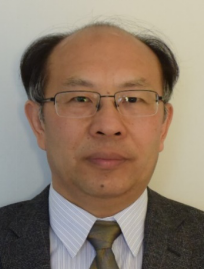 Biograph: Wei-Ping Zhu received his Ph.D. degree in 1991 from Southeast University, Nanjing, China. He was a Postdoctoral Fellow from 1991 to 1992 and a Research Associate from 1996 to 1998 with the Department of Electrical and Computer Engineering, Concordia University, Montreal, Canada. During 1993-1996, he was an Associate Professor with the Department of Information Engineering, Nanjing University of Posts and Telecommunications. From 1998 to 2001, he worked in hi-tech companies in Ottawa, Canada, including Nortel Networks and SR Telecom Inc. Since July 2001, he has been with Concordia’s Electrical and Computer Engineering Department as a full-time faculty member, where he is presently a Full Professor.
Biograph: Wei-Ping Zhu received his Ph.D. degree in 1991 from Southeast University, Nanjing, China. He was a Postdoctoral Fellow from 1991 to 1992 and a Research Associate from 1996 to 1998 with the Department of Electrical and Computer Engineering, Concordia University, Montreal, Canada. During 1993-1996, he was an Associate Professor with the Department of Information Engineering, Nanjing University of Posts and Telecommunications. From 1998 to 2001, he worked in hi-tech companies in Ottawa, Canada, including Nortel Networks and SR Telecom Inc. Since July 2001, he has been with Concordia’s Electrical and Computer Engineering Department as a full-time faculty member, where he is presently a Full Professor.
Prof. Zhu’s research has been centered at the study of advanced signal processing algorithms for the processing of speech and information signals in wireless communication. He has made a number of significant contributions on MIMO and OFDM channel estimation, sources localization, beamforming and signal estimation with antenna arrays, as well as wireless relay networks. He has published 140 papers in IEEE Transactions and international journals, and 180 papers at international conferences. Prof. Zhu has also contributed significantly to IEEE and the research community. He served as an Associate Editor in the area of signal processing for a number of reputable journals including the IEEE Transactions on Circuits and Systems Part I: Fundamental Theory and Applications, Circuits, Systems and Signal Processing, the IEEE Transactions on Circuits and Systems Part II: Transactions Briefs, the Journal of Franklin Institute, as well as or Guest Editor for the IEEE Journal on Selected Areas in Communications. He also served as the Secretary of the Digital Signal Processing Technical Committee (DSPTC) of the IEEE Circuits and System Society during June 2012-May 2014, and as the Chair of the DSPTC during June 2014-May 2016.
Title: Speech Enhancement with Deep Learning
Abstract: Deep learning (DL) based on various neural network architectures has been widely investigated for many promising applications in different fields. Recent studies on speech enhancement have resorted to deep learning as a primary tool to develop data-driven techniques. This talk introduces several new developments on speech enhancement with deep neural networks (DNN). These include a fully convolutional neural network (CNN) for complex spectrogram processing, a two-stage speech processing with DNN and Kalman filtering, and a composite neural network model using both CNN and a long short-term memory (LSTM) for complex ideal ratio mask estimation. Experimental results demonstrate the merit of the new approaches in comparison with some state-of-the-art speech enhancement methods.